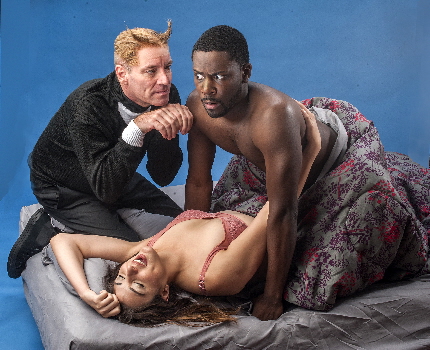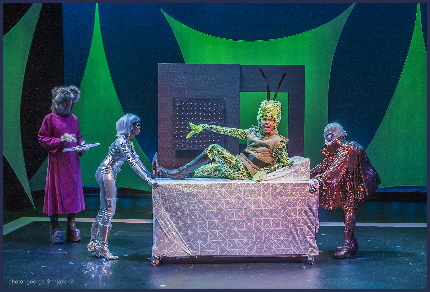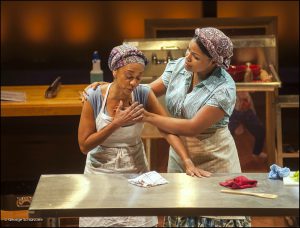
(This article is reprinted from the December issue of American Theatre magazine. City Theatre’s Winter Shorts is currently in performance at the Arsht Center)
For 23 years this Miami theatre has made short-form theatre a priority, a specialty, and something of a superpower.
By Bill Hirschman
For some who view two-part events on Broadway and five-hour epic tragedies as the height of the theatrical form, the 10-minute play is condescendingly tolerated as the poor relation at the arts table. But not in Miami.
City Theatre, a home-grown company created by three colleagues around a kitchen table 23 years ago, has become the leading purveyor of short-form theatre in the country. Indeed no other company produces the a comparable array of programs devoted to encouraging, developing, commissioning, and mounting short plays and musicals in the U.S., from staging world premieres to crucial second and third productions.
The particular pride of City Theatre is its expertise in conquering the unique challenges of writing, producing, and performing affecting dramas, riotous comedies, trenchant satires, and lyrical musicals that must complete a satisfying arc in the same time that many full-length plays take just to get off the ground.
And with Kentucky’s Actors Theatre of Louisville ending its short-play contests and festivals in 2017, City Theatre has emerged as the professional company most committed to championing an art form as formidable as any other. After all, short stories are recognized as a literary form of comparable value to novels; why not short plays?
It began simply as Summer Shorts, which became a staple of the region’s arts season, but its scope has grown so wide that City now produces evenings of playlets on cruise ships around the world through its Shorts on Ships initiative.
The theatre’s folio of short-play anthology offerings now includes Winter Shorts; the R-rated Shorts Gone Wild, focusing on LGBTQ themes; City Shorts, which trawls the southeastern quarter of the state; First Reads; Short Cuts, youth-tailored works that tour Miami-Dade schools; NextGen, which mentors high school playwrights; Island Shorts, visiting the Florida Keys; the acclaimed CityWrights weekend conference of readings, workshops, and networking for playwrights. They even produce the occasional full-length play, such as Building the Wall. The company’s highest-profile project, the City Theatre National Award for Short Playwriting Contest, may be the largest of its kind in the U.S.
Those efforts have produced around 575 plays from 240 playwrights including Lauren Gunderson, Christopher Durang, Deborah Zoe Laufer, Jane Martin, Moisés Kaufman, Paul Rudnick, Lin-Manuel Miranda, and Jon Robin Baitz. About 145 were world premieres.
On that roster are more than 50 South Florida playwrights who imbue the festivals with a decidedly Miami vibe: fresh, vibrant, youthful, and unabashedly multicultural. Miami natives Tarell Alvin McCraney and Marco Ramirez had some of their earliest student works developed here.
“Sometimes I feel the work is minimized because of the length of play,” said artistic director Margaret Ledford. “But it is just as hard to put up a short play as it is to put up a full one, and even more so with nine plays than a single one.”
Within a single evening of shorts, the range can be stunning: A quiet man at a sporting goods store picks out a uniform for his young son, who we later realize has died. An alien spaceship navigator sporting insect antennae and pincers falls in love with a Princess Leia-like captain. Lin-Manuel Miranda’s 21 Chump Street portrays a high schooler who will do anything to get a date with the new girl in class.
Festival boosters are effusively passionate. Nan Barnett, a former Floridian, works with the company as executive director of the National New Play Network. “I have been a fan of City Theatre’s programming from the beginning,” she says. “The selection, audition, rehearsal, and tech process that results in Summer Shorts still takes my breath away.”
Steve Yockey, a playwright ubiquitous in regional theatres, wrote in an email, “The first time I saw Summer Shorts, I straight up lost my mind. The level of realization these short plays receive onstage exceeds anything around the country, with the possible exception of ‘The Ten’ at the Humana Festival. After I saw my first season of the festival—the knowledge of what they could achieve hugely expanded my production requests with each play moving forward. I’m sure they wish they never let me see it in person.”
He stressed that playwrights feel appreciated at City Theatre more than at many other companies. “Shorts provides an incredible laboratory for testing ideas and techniques or playing with voice,” Yockey wrote. “They continue to be incredibly supportive of playwrights they’ve produced in an ongoing way, long after the productions have ended,” he said, including helping getting work published and spreading word among other theatres.
 Tom Wahl, Cherise James, Andres Maldonado, and Meredith Bartmon in the musical “Warped,” part of City Theatre’s Summer Shorts 2016. (Photo by George Schiavone)
Tom Wahl, Cherise James, Andres Maldonado, and Meredith Bartmon in the musical “Warped,” part of City Theatre’s Summer Shorts 2016. (Photo by George Schiavone)
There’s a widespread misunderstanding of what constitutes a superlative short play. It is not simply a premise hammered over and over, like a “Saturday Night Live” sketch—a condition common to many submissions to City’s short-play contest. As dramaturgically demanding as any epic, a short must have an easily identifiable beginning, middle, and—the place many works falter—an end.
According to Ledford, effective work in this realm is layered, “hooked into some elemental part of being human or something so distinctly familiar, or a new concept that just zings in the way that you hear it.”
City co-founder and literary director Susan Westfall, who’s also a playwright, said she favors “really interesting, rich characters who are going to surprise you…but in whom you are going to see yourself or someone you know.” And the ultimate test, even for a farce, she said, is, “Are you thinking about this play an hour later? Would you pay cash money to see it?”
Those and a half-dozen other criteria are essential, because City Theatre capped submissions this year at 500, after decades of sifting through 1,000 scripts annually. Most come from their annual contest. Some are submitted by playwrights and agents whom the company knows, or the Samuel French licensing firm.
“They also dove in and became one of the early users of the Opportunities module of National New Play Network’s New Play Exchange, the online database of plays by living writers that has become a principal part of the discovery system of new works and writers for theatres around the world,” said Barnett.
Six to 10 readers spread across the country make the first cut with a tongue-in-cheek system whose rankings include “not bad, not special,” which means plays are immediately rejected; “interesting” offerings; “you have to see the play on the City Theatre stage,” and “set this play on fire.” The readers “don’t have any sentimentality,” said Westfall. “They don’t send me notes that we should encourage this playwright or give it back to them for three weeks’ work.”
City Theatre staffers and insiders cull the list down further, to 200, and eventually to about 25 finalists. “Then it becomes a question of why this play over that play, where is this play set, what are the ages, who are the people, what is this point of play, is it an office play or a relationship play, a kids’ play?” Ledford said.
Some of the winners will be performed immediately, some will receive staged readings in the company’s on-the-road tryout productions, and some promising works that don’t fit current production needs are kept in an active file for when the appropriate slot opens.
Occasionally a piece is reused. Both Summer Shorts and the schools tour mounted Run by Bekah Brunstetter, for instance, because its story—a father takes his portly teenager on a one-mile run, during which she vents all the worries facing her upcoming generation—worked for both audiences.
The production process continues with potential plays shared months ahead of time with recurring hands like scenic designer Jodi Dellaventura, who provides specifics for each play but also a coalescing umbrella vision for the evening. Discussions among Ledford, directors, and designers intensify even before the final selection of nine or 10 plays for a program is made.
Actors and directors are drawn almost exclusively from South Florida professionals, most of them Equity. Many have worked together for years in many companies, providing an essential instant chemistry. But emerging talents are also hired, training reliable options for the future.
Employing many of the same actors, designers, and directors over time has produced a corps that can smoothly handle hurdles that arise. “An actor needs to be versatile, period,” said Ledford. “They have to be able to do a serious play and a comedic play within seconds of each other. They have to mine that emotional depth and have comic timing. And they are people who are not about grandstanding, who are really ensemble members.”
The upside for actors: They get to undertake a range of roles they might not otherwise be asked to try. In a recent edition, Tom Wahl portrayed a genial elf meeting his son’s human girlfriend in a musical, then a silent, self-centered cat persistently interrupting his owner’s coupling with a boyfriend, then a suburbanite dealing with the emotion of de-cluttering, then a burned-out alcoholic writer destroying his career, and finally a grass-skirt-shaking hula girl figure in Disney’s It’s a Small World exhibit.
Karen Stephens, an African American actor lauded for dramatic roles, relishes the opportunity to show her comic chops. “I think that it’s unfortunate that actors don’t get to stretch” in South Florida, where short rehearsal times can lead to typecasting. “The character I had last year, the lady in the art gallery—she had a broad New York accent and she was eccentric, and I otherwise wouldn’t get to do a character like that.”
Multiculturalism is embedded in the South Florida’s DNA, so casting at City has always been intentionally diverse—an added attraction for performers. Said Stephens, “It’s definitely a place where black actors get to do roles” they wouldn’t otherwise. She laughed, recalling she once “played a captain on a spaceship.” In another, she played the mother of a white performer her own age.
Similarly, when hiring directors, the company takes a chance using artists better known as actors and playwrights.
As is common in South Florida, the rehearsal period is limited to two weeks, plus two tech days, a daytime run-through before opening night, and the recent addition of extra previews. Playwrights can Skype into rehearsals but rarely rewrite, because time is precious. That part of the work is especially challenging, Stephens conceded.
“We’re changing hats all day long and switching directors and subject matter and characters,” she said. “It’s grueling, but the camaraderie makes it all worthwhile.” Even deep into the run, Stephens said, “it’s still a bit of a marathon, especially when you have back-to-back pieces. But the more you do it, the better it gets; the more you understand, the more fun you’re having.”
Achieving that Sybil-like versatility requires “nothing conscious other than standing for a moment in the dark and switching. You run offstage for a costume change and then run into place. Just before you go, everything goes dark.” The moment she hears a voiceover introduction announcing the title and author, Stephens said, is “when I center myself, step out of where I just came from and go where it’s going.”
The production then runs for four performances a week for four to five weeks in a reconfigurable 175- to 193-seat space.
Two decades on the short-play beat have taught the staff some valuable lessons:
* Playwrights should not restrain their visions; imaginative directors, producers, and designers can make almost anything work for an audience that understands the budgetary limitations. Wrote Yockey, “It’s a chance to really go out on a limb creatively, whether that’s with crazy scale and spectacle or with a small, incredibly focused idea.”
* Don’t schedule too many plays in a single evening, no matter the temptation of promising work. Nine works with an intermission is optimum for the audience’s attention span, the actors’ stamina, the morphing logistics and the production team’s capabilities.
* Avoid clustering thematically similar works or genres, no matter how good they are. In her curtain speech, Ledford tells the audience that they are going to see an entire season of theatre in 90 minutes.
* It’s essential to create close cooperative working relationships with people willing to compromise and be inventive, from performers to support staff. No egos, no divas. Keep the numbers small, with a repertory group of six to nine actors (plus interns) and four or five directors.
* Know that not every piece will land with every audience member; indeed, not every piece will work when it’s finally produced.

Karen Stephens and Chasity Hart in “Risen Like the Dough,” part of Summer Shorts 2015. (Photo by George Schiavone)
How and why did this curiously specialized theatre begin? Modestly. In December 1995, South Florida theatre had outgrown its dinner theatre roots, but after the snowbirds flew home, summer remained a slow time for patrons and theatre professionals. Westfall, actor-director Stephanie Heller Norman, and actor Elena Wohl, recently transplanted from Los Angeles, talked up the success that L.A.’s Naked Angels had had with short works. The response? “I was incredibly dismissive,” Westfall admitted. “I was writing full-length plays.”
But over a kitchen table, the three women mapped out a plan to take advantage of the lull in competition and the wealth of theatre artists at liberty. The University of Miami offered its Ring Theatre rent-free if the company would use students as interns. The trio determined to pay playwrights, performers, and staff, and to hire Equity performers from the start. They raised seed money, in part, through a golf tournament organized by the women’s colleagues from previous projects and the trio’s husbands.
The first edition in 1996 comprised two nine-play programs running on the weekend, with a picnic dinner served in between. Miami Herald theatre critic Christine Dolen suggested they extend the two-week run. That extension sold out, and even made money over its $30,000 budget.
Later, Shorts became one nine-play program, but moved into the sophisticated black-box theatre in downtown Miami’s major presentation house, the Adrienne Arsht Center for the Performing Arts.
The full-time staff has always been tiny, but a core soon emerged, including initial artistic director and now special projects manager Gail Garrisan. With the shuttering of the venerable Coconut Grove Playhouse in 2006, there was talent available for recruitment, including sound designer Steve Shapiro, production manager David Radunsky, and costume designer Ellis Tillman.
While men have been integral—such as current executive director Bruce Leslie—the company has always prioritized hiring female artists and administrators, currently including literary and programs manager Amy Coker and administrative manager Jessica Farr. The commitment to gender equity extends to playwrights: More than a third of City-produced works and more than 40 percent of its world premieres have been penned by women.
The budget now approaches $950,000 (kept manageable with a small year-round staff), with about 60 percent coming from hundreds of patrons, foundations, corporations, and notably grants from the cities and counties they perform in.
In proving a hungry summer audience existed, City Theatre has helped to spark a new paradigm. Now the local theatre calendar barely slows in the sweltering months. While its founders never envisioned reaching the 25-year mark, which they’ll hit in 2020, the theatre’s staff and supporters are dreaming of expansion: more commissioning and developing works, publishing a second volume of successful pieces, monetizing their hard-won expertise through consulting, helping more playwrights get their work published, producing more musicals, and especially exploring short plays produced alongside short films.
One thing that won’t be expanding: the length of the plays. City Theatre knows they’re onto a good thing. As NNPN’s Barnett put it, “I have repeatedly witnessed the joy that is generated when an audience comes together for a Shorts performance: people of all ages, religions, and ethnicities laughing and crying together over the traits we share as humans.”








 A PaperStreet Web Design
A PaperStreet Web Design

One Response to Now The National Leader, City Theatre’s Long History Championing The Short Play